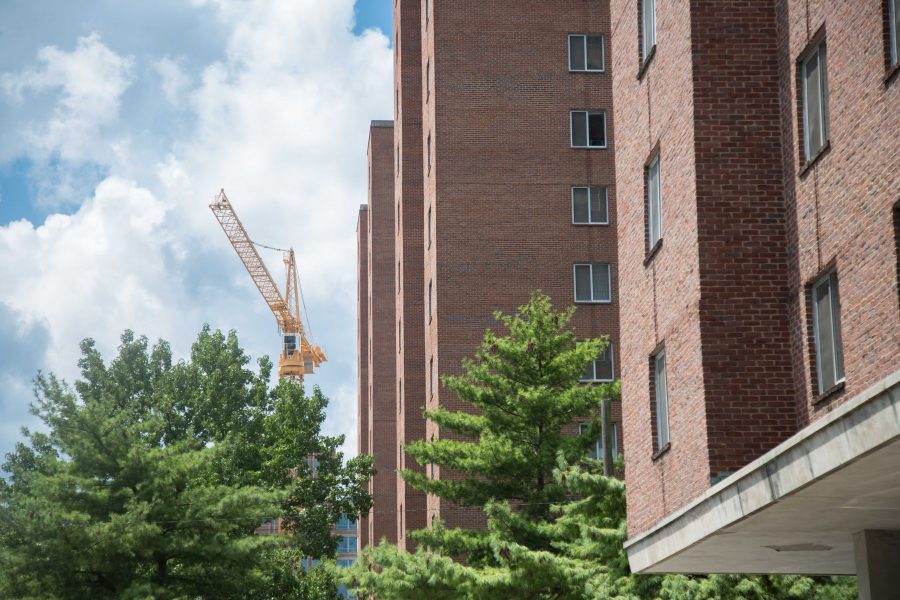At a VSG town hall on Wednesday evening, university administrators discussed topics related to housing with students. Present at the event were Jim Kramka, the Senior Director of Housing Operations, and Randy Tarkington, the Senior Director of Residential Education. The event allowed students, especially those interested in off-campus housing or concerned about the conditions of their housing, to voice their concerns and ask questions to university administrators.
Students at the town hall asked about the process of applying for off-campus housing this spring. When Carmichael Towers West comes down in May 2020, Vanderbilt’s on-campus housing inventory will lose 576 beds. In response, the Office of Housing and Residential Education plans on increasing off-campus authorizations from 350 to over 900 spots. While the number of authorizations will increase, the process for applying for authorization remains the same as previous years.
“I know that a lot of people thought we changed the process from last year, but nothing’s changed,” Kramka said. “The rules were set in 1959 by the Board of Trust, who says that all undergraduate students must live in on-campus housing, unless there is not enough housing. So the rules stay the same. What fluctuates is the number of beds we have on hand, and the student population.”
By determining the student population and the number of beds available on-campus in a given year, Housing Operations can determine the number of people authorized to live off campus. All rising junior and seniors can request authorization to live off-campus.
According to Kramka, all undergraduate students must complete the 2019-2020 Housing Registration form online in early January. Then, students interested in living off-campus must complete the Off-Campus Housing Application between Jan. 16 and Jan. 22. These forms can be found through the university housing portal.
After OHARE Housing Assignments receives these requests, they select students to receive authorization based on seniority and special circumstances.
“The first priority are those students who need special accommodations,” Kramka said. “The second priority are students who are currently living off-campus. We don’t want to make people move back to campus, unless they want to. The third priority are rising fourth-year students and higher. After that, we can provide authorization to rising third years.”
According to Kramka, students should not sign a lease until they receive authorization from OHARE. While students can shop around before receiving authorization, Housing Assignments will not make exceptions to students who have already signed a lease with a housing provider.
Other students at the town hall voiced complaints about their current living conditions, including concerns about mold, a lack of hot water, and unsanitary bathrooms.
“It’s our responsibility to maintain the conditions of our on-campus facilities,” Kramka said. “This includes heat, water, internet, all sorts of different things. We try to do a good job, but we don’t always succeed.”
According to Kramka, OHARE received only 22 reports over two months from Blakemore residents about mold. However, the mold problem in Blakemore turned out to be widespread.
“If everyone who had been affected by mold had filed maintenance reports, the situation would have been handled better,” Kramka said.
According to Tarkington, universities in the Southeast sometimes cannot avoid mold in housing. After an especially humid summer and fall, many universities have been affected by mold, with some even having to close dormitories.
“We need to be better about communicating about mold and mildew,” Tarkington said. “The minute you see something, we need to treat it.”
One student voiced concern about dirty and unsanitary bathrooms in Branscomb. According to Kramka, OHARE tries to conduct routine maintenance equitably across the entire housing system. Currently, Plant Operations are working on heating and cooling systems in Branscomb, but otherwise, Kramka does not foresee big changes or renovation in Branscomb.
“We would never let a building be unsafe, even if that building will come down soon,” Kramka said. “However, safety improvements may not look or feel better. Often, bathrooms are stained, but not dirty. Trying to make bathrooms in Branscomb look new would be a major renovation.”
A student living in Towers West asked the administrators about construction noise during the week of finals. After Dec. 5, construction on West End will not begin until 8 a.m. In addition, the construction company has purchased sound-blocking drapes, which will initially installed in lower-level rooms facing construction and Greek Row.
“Subcontractors do not always follow Vanderbilt’s quiet hours for construction,” Kramka said. “However, the general contractor is aware of student issues, and if they don’t follow that, housing needs to know.”

